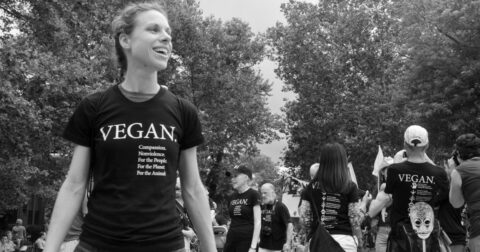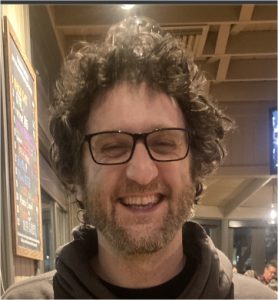Solutions
In New York City Hospitals, Over 1 Million Vegan Meals Served
Diet•4 min read
Explainer
A short primer on veganism, both the strict and not-so-perfect kind.


Words by Seth Millstein
Veganism has experienced a surge in popularity over the last decade, with the number of Americans following vegan diets growing from 1 percent of the population to 6 percent over a three-year period between 2014 and 2017. While there are a number of reasons for the upward trend, there are also many misconceptions around what vegans eat, what they don’t eat, and what exactly being a vegan means.
Veganism can take several forms, but at the broadest level, a vegan is somebody who doesn’t use or consume animal products. This refers not only to animal-based foods like meat and dairy, but also clothes, cosmetics, glues, cleaners and other non-food items that include animal derivatives in their ingredients.
There are also some products that don’t include animal derivatives in them, but do utilize animal derivatives at some point during the production process; for instance, certain sugars are filtered through charred livestock bones in order to make them white. Many vegans don’t consume those products, either.
Vegans of the above sort are often called “lifestyle vegans,” as their commitment to forgoing animal products extends to all areas of their lives. However, many people use the term “vegan” to refer to “dietary vegans” — people who don’t eat foods with animals in them, but do permit themselves to use non-food products made from animals, such as glue or leather.
In addition to the differences between lifestyle vegans and dietary vegans, there are several different varieties of dietary veganism that are worth teasing out.
As the name suggests, raw food vegans only eat foods that aren’t heated or cooked. Raw food vegan diets tend to be heavy in fruits, nuts, seeds and legumes.
In addition to forgoing animal products in their diets, whole food vegans also restrict themselves to non-processed foods. The diets of whole food vegans often look similar to the diets of raw food vegans, except whole food vegans have no qualms about cooking their food.
There are an abundance of healthy vegan foods out there, but there are plenty of unhealthy ones as well. Oreos, Pop-Tarts and Nutter Butter cookies are all vegan, for instance, and so are many other cookies, donuts, frostings, pies and other foods that aren’t so great for one’s health, whether vegan or not. While junk food vegans may not be doing their own health any favors, they’re still benefiting the environment and animals by cutting meat and dairy out of their diets. And it’s not always all or nothing. There are many people, including vegans, who eat a mostly healthy diet, but also indulge in the occasional junk food treat.
Some people want to be vegans, but have trouble committing to full-time dietary veganism for one reason or another. Others are simply interested in eating a more plant-forward diet rather than strict veganism. As such, some people create parameters for their veganism or meat reduction goals; for example, they might only eat animal products on weekends, or holidays, or for dessert or when the food in question would otherwise be thrown out.
Whether or not strictly vegan, eating a plant-rich diet is one of the most powerful forms of individual climate action, according to Project Drawdown. Getting more people to eat less meat would not only help reduce climate emissions, but also reduce air and water pollution, animal suffering, risk of zoonotic disease and labor abuses.
Vegetarians do not eat meat, but do allow themselves to eat non-meat products that are derived from animals. Foods with eggs, milk, cheese and honey are all fair game for vegetarians; beef burgers, turkey hot dogs and shrimp are not.
As with vegans, there are different kinds of vegetarians as well. Lacto vegetarians don’t eat eggs or meat but do eat dairy, while ovo vegetarians don’t eat dairy or meat but do eat eggs, and pescetarians allow themselves to eat fish, but no other meat. Some climate advocates have urged people to become a “chickentarian” by eating more chicken than beef. Such a dietary change would indeed reduce greenhouse gas emissions but, as the evidence suggests, would also be a disaster for animal welfare.
While it would be a stretch to say that there are as many reasons to go vegan as there are actual vegans, people who choose to adopt a vegan diet or lifestyle have a variety of different reasons for doing so.
Many people go vegan because they care about animals and don’t want them to suffer. Other vegans don’t have any issue with eating animals in theory, but have serious issues with the manner in which animal products are made in modern society. The overwhelming majority of animal-based foods are produced in factory farms, and the animals in factory farms experience pain, suffering and stress over the course of their lives. The same goes for animals used in other industries, such as the cosmetics industry. As such, many people go vegan simply because on a practical level, it’s difficult or impossible to know with certainty that any given animal product didn’t inflict suffering on the animal in question.
Despite some nuances in their beliefs, both of these types of vegans are motivated by a concern for the wellbeing of animals.
The research is conclusive: the production of meat and dairy is destroying the environment, and many people stop eating animal products for this reason. There are a number of reasons why the meat and dairy industries are so destructive:
In a recent study, 52 percent of young vegans said that they adopted vegan diets not out of concern for the environment or animals, but rather, because they want to be healthier. While conflicting studies proliferate in the field of nutrition, plenty of research does show a link between eating more fruits and vegetables and good health. In addition, several studies have shown that a vegan diet can have promising results for improving heart health and avoiding or combatting Type 2 diabetes.
Don’t let the price of Impossible Burgers fool you: veganism is one of the cheapest diets out there, provided you aren’t subsisting solely on high-end imitation meat. A 2021 Oxford study found that vegan diets are more affordable than any of the alternatives, and that going vegan can reduce one’s food costs by up to a third, while a later study found that low-fat vegan diets are around 16 percent cheaper than omnivorous ones.
It’s easier than ever to be a vegan, but that doesn’t mean it’s effortless. The U.S. food system is based primarily on animal agriculture — in fact, most cropland in this country is used for growing animal feed (and ethanol) rather than crops for people. This creates many obstacles for vegans and anyone else looking to eat more plants instead of meat.
If you’re thinking about going vegan, there are a few key tips that might make your transition easier.
Veganism may seem daunting or complicated, but it doesn’t have to be, and it also doesn’t have to be all or nothing. For anyone who wants to eat less meat and more plants, there’s no shortage of guides and advice to help you make the transition.